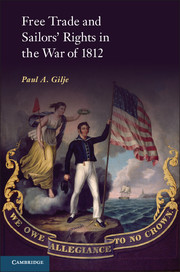24 - Popular Culture
Published online by Cambridge University Press: 05 March 2013
Summary
Free trade and sailors’ rights remained embedded in American popular culture in the years between the War of 1812 and the Civil War. For the common seaman the phrase continued to have importance, although every sailor could as easily make fun of himself by misapplying the term in comic relief. For the rest of the public, the phrase may have resonated with the legacy of the Revolution and the memory of the War of 1812, but it could be also twisted and turned to a variety of uses. The phrase was plastered across a wide range of material objects, both for everyday use and also for special commemoration. As with politicians, common folk toasted free trade and sailors’ rights on the Fourth of July and other special occasions. Americans also used and abused the phrase, spouting it to assert their patriotism and featuring it in business advertisements. Variations appeared, stretching its meaning to all kinds of purposes. African Americans confronting an intensifying racism could cite their participation in the War of 1812, along with the cry of free trade and sailors’ rights, to assert their claim to citizenship. For many Americans, however, by the 1840s and 1850s, Porter's motto had begun to lose its appeal and meaning.
Seamen had a special claim to the legacy of free trade and sailors’ rights, yet the ability to mock even what sailors held sacred, as was seen in Dartmoor prison, persisted in the years after the war. A group of sailors recruited for the United States Navy in 1845 objected to having the bar closed to them aboard a steamboat between Amboy and New York. The recruits democratically voted that this action was an outrage, or “as a wag of the party put it,” this “aristocratic dram shop” had committed “an infringement on the ever-to-be-respected doctrine of Free Trade and Sailors Rights.” With that declaration the sailors broke into the bar and drank without paying a cent. One whaleman comically decorated a piece of scrimshaw with two rough-looking sailors leaning on an oval below an eagle holding a banner with free trade and sailors’ rights above and a rum bottle between them. Inside the oval a topless mermaid held another bottle with the words “Jack contending for the motto” beneath.
- Type
- Chapter
- Information
- Free Trade and Sailors' Rights in the War of 1812 , pp. 324 - 336Publisher: Cambridge University PressPrint publication year: 2013



